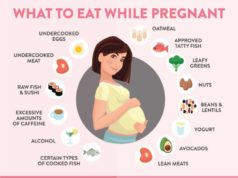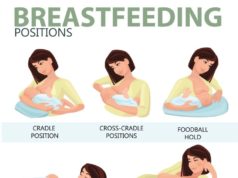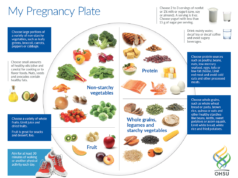Recommended Dietary Allowance for pregnant women is a crucial aspect of ensuring a healthy pregnancy for both mother and baby. During pregnancy, a woman’s body undergoes significant changes, demanding increased nutrient intake to support fetal growth and development. Understanding the recommended dietary allowance (RDA) for various nutrients is essential for meeting these demands and promoting optimal maternal and fetal well-being.
This guide will delve into the importance of RDA during pregnancy, exploring the key nutrients essential for a healthy pregnancy, and providing insights into how to meet these nutritional needs through diet and supplementation. We will also discuss the role of prenatal care in monitoring nutrient status and adjusting dietary intake as needed.
Factors Influencing RDA
The Recommended Dietary Allowance (RDA) for pregnant women is not a fixed value but rather a dynamic guideline that considers various individual factors. These factors can significantly influence the specific nutrient requirements during pregnancy, ensuring optimal health for both the mother and the developing fetus.
Age and Weight
A pregnant woman’s age and weight can impact her nutrient needs. For instance, younger women may require higher levels of certain nutrients, such as iron, due to their still-developing bodies. Conversely, women who are overweight or obese may have increased requirements for folate and vitamin D.
The RDA for iron during pregnancy is 27 mg per day, but women who are younger or have lower body weight may need to consume more to meet their individual needs.
Pre-existing Conditions
Pre-existing conditions, such as diabetes, anemia, or hypertension, can further modify nutrient requirements during pregnancy. For example, women with diabetes may need to adjust their carbohydrate intake and monitor their blood sugar levels more closely.
Women with pre-existing conditions should consult with their healthcare provider to discuss personalized dietary recommendations and supplements.
Multiple Pregnancies
Multiple pregnancies, such as twins or triplets, place a greater demand on the mother’s body. This increased demand can lead to higher nutrient requirements, particularly for iron, folate, and calcium.
The RDA for iron during twin pregnancies is 30 mg per day, compared to 27 mg for single pregnancies.
Gestational Age, Recommended Dietary Allowance for pregnant women
Nutrient needs vary throughout the course of pregnancy. The first trimester is crucial for fetal development, requiring higher levels of folate, iron, and vitamin B12. The second and third trimesters are characterized by increased fetal growth and require higher levels of calcium, zinc, and iodine.
The RDA for folate is 600 mcg per day during the first trimester, increasing to 800 mcg per day during the second and third trimesters.
Supplements and RDA
Prenatal vitamins and supplements play a crucial role in bridging the gap between dietary intake and the increased nutrient requirements during pregnancy. While a balanced diet should form the foundation of a healthy pregnancy, supplements can help ensure that expectant mothers meet their RDA for essential nutrients.
Types of Supplements
Supplements are often recommended to address potential deficiencies that may arise during pregnancy. Here are some common supplements:
- Folic Acid: Crucial for neural tube development in the fetus. Recommended daily intake is 400 mcg.
- Iron: Essential for red blood cell production and oxygen transport. The RDA for iron during pregnancy increases to 30 mg per day.
- Calcium: Supports bone growth and development in both mother and baby. The RDA for calcium increases to 1,000 mg per day during pregnancy.
- Vitamin D: Plays a vital role in calcium absorption and bone health. The RDA for vitamin D during pregnancy is 15 mcg per day.
- Iodine: Essential for thyroid hormone production, which is crucial for fetal brain development. The RDA for iodine during pregnancy is 220 mcg per day.
- DHA (Docosahexaenoic acid): An omega-3 fatty acid that is crucial for brain and eye development in the fetus. The recommended intake during pregnancy is 200-300 mg per day.
Benefits and Risks
While supplements can be beneficial, it is important to be aware of potential risks associated with their use.
- Benefits: Supplements can help ensure that pregnant women meet their RDA for essential nutrients, which is crucial for the health of both mother and baby. They can also help to prevent certain birth defects and other complications.
- Risks: Excessive intake of certain supplements can be harmful. For example, high doses of vitamin A can be toxic to the fetus. It’s essential to consult with a healthcare professional to determine the appropriate dosage and type of supplements based on individual needs and health conditions.
It is crucial to emphasize that supplements should not replace a healthy diet. A balanced diet rich in fruits, vegetables, whole grains, and lean protein should be the foundation of a healthy pregnancy.
Monitoring and Adjusting RDA: Recommended Dietary Allowance For Pregnant Women

During pregnancy, monitoring dietary intake and nutrient status is crucial to ensure the mother and developing fetus receive adequate nutrition. Regular prenatal checkups and blood tests play a vital role in assessing nutritional needs and identifying any potential deficiencies. This information helps healthcare providers adjust dietary recommendations and supplement use as needed.
Monitoring Dietary Intake and Nutrient Status
Monitoring dietary intake and nutrient status involves various methods. These methods help healthcare providers understand a pregnant woman’s dietary habits and identify any potential deficiencies.
- Food Diaries: Keeping a detailed food diary allows healthcare providers to assess a pregnant woman’s typical food intake. This diary should include the type, quantity, and frequency of foods consumed throughout the day.
- Dietary Recall: In this method, healthcare providers ask pregnant women to recall their food intake over a specific period, typically 24 hours. This information provides insights into their dietary patterns.
- Nutrient Analysis Software: Using specialized software programs, healthcare providers can analyze a pregnant woman’s dietary intake based on the information provided in food diaries or dietary recalls. This analysis provides a comprehensive overview of nutrient intake and identifies any potential deficiencies.
Importance of Regular Prenatal Checkups and Blood Tests
Regular prenatal checkups and blood tests are essential for monitoring the health of both the mother and the developing fetus. These tests help identify any potential health issues, assess nutrient status, and monitor fetal growth and development.
- Prenatal Checkups: During prenatal checkups, healthcare providers monitor the mother’s weight, blood pressure, and overall health. They also discuss dietary habits, assess any concerns, and provide guidance on maintaining a healthy pregnancy.
- Blood Tests: Blood tests are crucial for assessing nutrient status, detecting any potential deficiencies, and monitoring fetal health. These tests often include:
- Complete Blood Count (CBC): This test measures the number of red blood cells, white blood cells, and platelets in the blood. It helps identify anemia, infections, and other blood disorders.
- Iron Levels: Iron levels are crucial for red blood cell production and oxygen transport. Low iron levels can lead to iron-deficiency anemia, which is common during pregnancy.
- Vitamin D Levels: Vitamin D plays a vital role in bone health and calcium absorption. Low vitamin D levels can increase the risk of complications during pregnancy.
- Thyroid Hormone Levels: Thyroid hormones are essential for fetal brain development. Low thyroid hormone levels can affect fetal growth and development.
Adjusting Dietary Intake Based on Individual Needs
Adjusting dietary intake based on individual needs is crucial to ensure optimal nutrition during pregnancy. This involves considering factors such as:
- Pre-pregnancy Weight: Women with a healthy pre-pregnancy weight gain less weight during pregnancy compared to those who are overweight or obese.
- Multiple Pregnancies: Women carrying multiples (twins, triplets, etc.) require higher calorie and nutrient intake due to the increased demand from multiple fetuses.
- Nutrient Deficiencies: If blood tests reveal any nutrient deficiencies, healthcare providers recommend dietary changes or supplements to address those specific needs.
- Food Preferences and Allergies: Dietary recommendations should consider individual food preferences and allergies. Healthcare providers work with pregnant women to create a personalized dietary plan that meets their needs and preferences.
Resources and Support
Navigating pregnancy can be overwhelming, and understanding your nutritional needs is crucial. Fortunately, numerous resources and support systems can guide you throughout your journey. This section explores valuable resources for obtaining accurate information about Recommended Dietary Allowances (RDAs) during pregnancy and emphasizes the importance of seeking support from trusted professionals and loved ones.
Reliable Resources for RDA Information
Finding reliable information on RDA during pregnancy is essential for making informed choices about your diet. Here are some trusted sources:
- The Office of Dietary Supplements (ODS): A division of the National Institutes of Health (NIH), ODS provides comprehensive information on dietary supplements, including those relevant to pregnancy. Their website offers detailed information on various nutrients, their roles in pregnancy, and recommended intakes.
- The American Pregnancy Association (APA): APA offers a wealth of information on pregnancy, including nutrition. Their website provides detailed articles and resources on RDAs, healthy eating during pregnancy, and common nutritional concerns.
- The Academy of Nutrition and Dietetics (AND): AND is a professional organization for registered dietitians. Their website provides evidence-based information on nutrition, including recommendations for pregnant women. You can also find a directory of registered dietitians in your area through their website.
- Your Healthcare Provider: Your doctor or midwife is your primary source of information and guidance regarding your health and nutrition during pregnancy. They can provide personalized recommendations based on your individual needs and any specific concerns.
Contact Information for Prenatal Nutrition Specialists
If you’re looking for more personalized guidance on your prenatal nutrition, consider consulting a registered dietitian specializing in prenatal nutrition. These professionals can provide tailored advice and support based on your specific needs and medical history. You can find a registered dietitian in your area through the Academy of Nutrition and Dietetics website.
Seeking Support from Family, Friends, and Healthcare Providers
Pregnancy can be a physically and emotionally demanding period. Having a strong support system is crucial for navigating this journey. Leaning on your family and friends for emotional support, practical assistance, and encouragement can make a significant difference. Your healthcare provider can also offer valuable support and guidance, ensuring you have access to the resources you need for a healthy pregnancy.
Pregnant women have unique nutritional needs, requiring increased intake of essential nutrients like iron, folate, and calcium. These dietary recommendations are just one example of how the Recommended Dietary Allowance (RDA) varies based on life stage. You can explore the RDA for different age groups, including children, adults, and seniors, here.
Understanding these recommendations helps ensure optimal health and well-being throughout pregnancy and beyond.
The Recommended Dietary Allowance for pregnant women is crucial for the health of both mother and baby. It can be challenging to adjust to these new dietary needs, but don’t worry, there are strategies to help you stick to a healthy eating plan.
How to Stick to a Diet: Your Ultimate Guide to Success provides valuable tips and techniques to make healthy eating a habit. By following these guidelines, you can ensure you’re meeting your nutritional requirements and providing the best possible start for your growing little one.
Meeting the Recommended Dietary Allowance (RDA) for pregnant women can be a challenge, especially when considering dietary restrictions. For those choosing a vegetarian lifestyle, it’s important to understand how to get all the essential nutrients, particularly iron and vitamin B12.
Is Vegetarian Diet Healthy: A Plant-Based Journey provides helpful information on navigating a vegetarian diet and ensuring adequate nutrient intake. With careful planning, pregnant women can thrive on a vegetarian diet, meeting their RDA and supporting a healthy pregnancy.
























